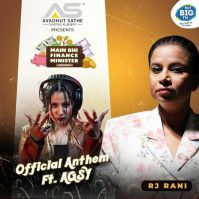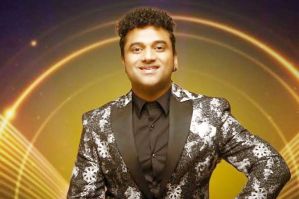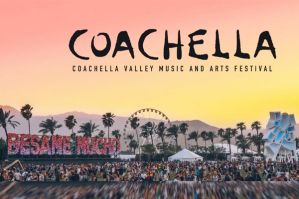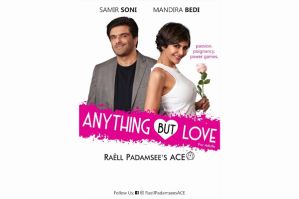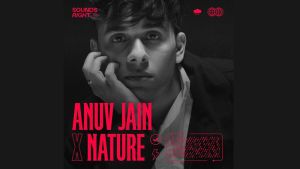Delhi's street children learn to rock
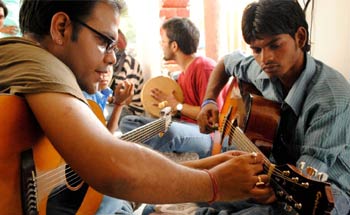
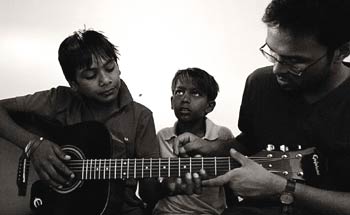
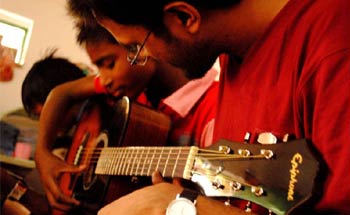
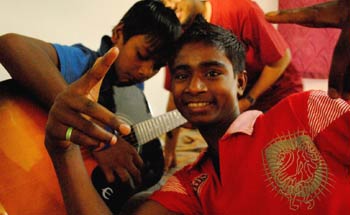
MUMBAI: For some music is entertainment, but its potential and power goes way beyond. And this is exactly what Music Basti, a unique music based project for street children has been exploring for the last two years.
Music Basti is a youth led volunteer program that creates partnerships with different institutions, organisations, artistes, musicians, bands and trains them in understanding the importance of human rights, and promotion of the right to expression, using music a tool.
At present there are over 250 children who are part of the outreach of Music Basti.
Speaking about motivation behind this project, Project Co-ordinator Faith Gonsalves says, "I started this program to create a fun space for interaction and learning. I have great respect and belief in music as a medium of self-expression, and self-expression is something that is often extremely challenging for the children that Music Basti works with.
"I think, music is an excellent medium to promote every child's right to self- expression because children's voices are amongst the most subjugated, and it's important to listen to what they have to say. This is a concept we promote through Music Basti," she says
The current phase of the Music Basti program constitutes activities in three areas of Delhi with a total of over two hundred street children, who are in the process of rehabilitation. These children are a part of the 'Dil Se' Campaign of Aman Biradari, to uphold the dignity and rights of the urban poor, especially children who live and work on the streets.
Music Basti began as a response to the reality that a majority of children are deprived of arts based education and exposure. The children that Music Basti works with are 'children- at risk', i.e. they may be street children, runaways, and orphans, abandoned by their families, society or education.
"It is important to build the skills of participation and inclusion along with protection, self-confidence and awareness, and a sense of self- worth. These are values and attitudes that help children excel in school and outside," says Gonsalves.
So far, 25 workshop programmes were hosted at Uma Pandey Home (August 2008- March 2009), and a documentary film �Music Basti' (15 minutes) was made to spread awareness and information was created. The documentary was later screened in colleges, schools, and festivals along with a concert by Delhi based eclectic fusion band Advaita (2008).
A year later, In March 2009, Music Basti featured an original performance with the boys from Uma Pandey Home, performing a song composed for the event, 'Yeh Pal', by Tarun Balani and an ensemble of Delhi musicians from prominent bands such as Advaita and FaridKot.
But no matter what the cause, finance remains a challenge.
At present, the organization is sustaining itself through the voluntary contributions of artistes and volunteers, who work part time or full time to contribute their time, efforts and ideas round the week and year. The project is part of the activities of Integrated Development Education Association (IDEA), and is supported by organizations including The YP Foundation, Bridge Music Academy, Aman Biradari, Furtados Music India, Gibson Foundation; and has collaborated with organizations including CRY, iCONGO and American Center, amongst others.
"Financial stability is problematic – because unlike in other societies, music education is not part of the Indian education system, and music is still in a nascent stage of proving its value to the development of children, through improving their skills towards school and curriculum matters, but more importantly their creativity, motor skills, language skills, self esteem, and self expression. The project model is gearing itself towards being more financially viable through the Music Modules, Song Project and Instruments Learning in order to ensure that children learn real skills they understand and can use, and so that this is process that can be replicated with different groups of children to generate maximum outcomes without wasting resources. However, financial and other support is necessary," she agrees.
On being asked if participation by mainstream composers or musicians will make any difference, Gonsalves says, "Mainstreaming is an important concept, and applies at two levels. Music in itself when it is taught, spoken about and performed needs to have relevance to the children's lives as a feasible option for livelihoods and even as a hobby recreationally. Visits by prominent artists, for example, Vishal Dadlani to Music Basti programs have seen an immensely positive reaction by the children, because it allows them to meet and interact with artistes who pursue music successfully."
While the project has garnered appreciation in Delhi, one would wish that something similar was there for other metro's too. However, for now, there are no plans to expand.
"We would love to promote the cause behind Music Basti in other cities, and are already in the process of knowledge sharing with bands/institutions outside Delhi through sharing information and learning-teaching ideas and concepts. We don't envision Music Basti institutionalizing itself in different cities necessarily. What is more important is that there is knowledge and resource sharing with other cities, and subsequently 2011 onwards we may be create opportunities to implement the Music Modules project and other projects in other cities."
Meanwhile, Music Basti is also working on a project of music modules that involves research and partnerships to plan, create and pilot a lesson-to-lesson format (incorporating music education with a focus on developing rhythm, melody, pitch, music awareness and appreciation, through a combination of non- formal and formal teaching methods, message driven songs and activities), based on the learning needs and desires of the children, to create a child- centric community development model.
"This project is 2-year project (2009-2011) to create a collective of musical experts and institutions, performers and teachers to collaborate to create Music teaching modules in order to make the music- workshops and lessons accessible, by making them easy to teach and replicate with different groups of children and is supported by Bridge Music Academy," she says.
In this entire program, established or well versed musicians musicians play an important role as Music Basti organizes exposure programs and concerts on a monthly basis to promote music awareness and appreciation. So far, these workshops have featured national and international artistes including Carrie Newcomer (folk and country), The Xylopholks (1920s ragtime), The Yale Gospel Choir (gospel and jazz), Aditya Balani Group (jazz quartet); Advaita (eclectic fusion), Dr Madan Gopal Singh and Group (sufi-folk), Vedanta (Indian fusion), Five8 (glam rock and funk), Cyanide, Vishal Dadlani, Warren Mendonsa, Drift!, Swarathma and others.
Send in your comments to: chirag.sutar@indiantelevision.co.in




